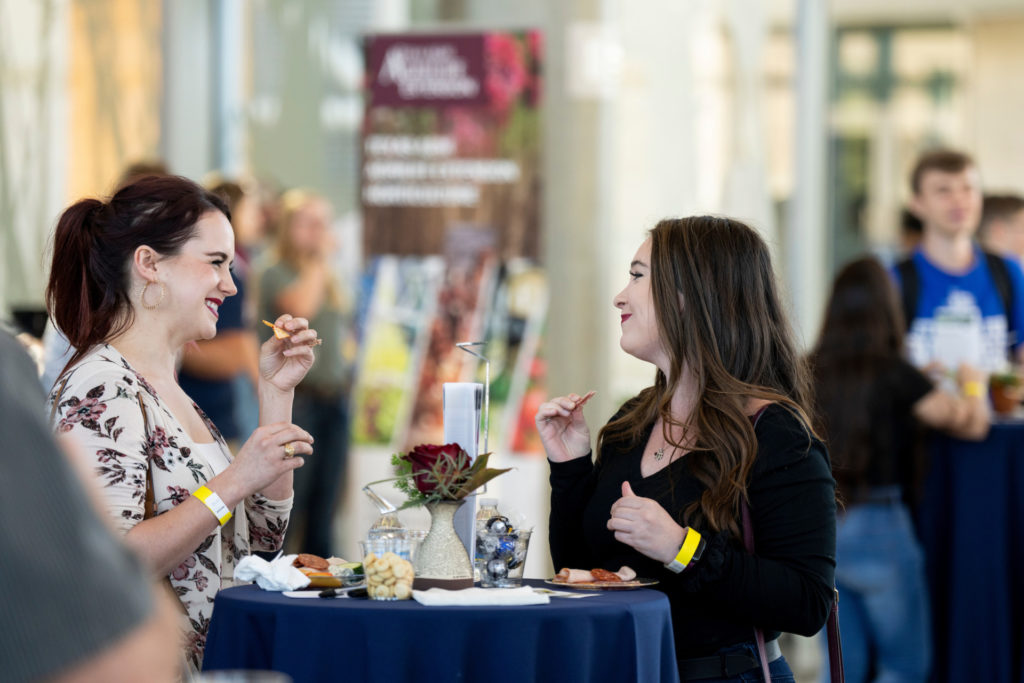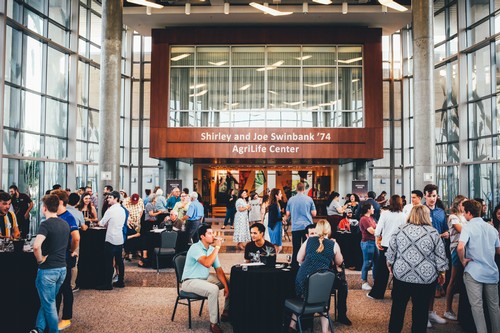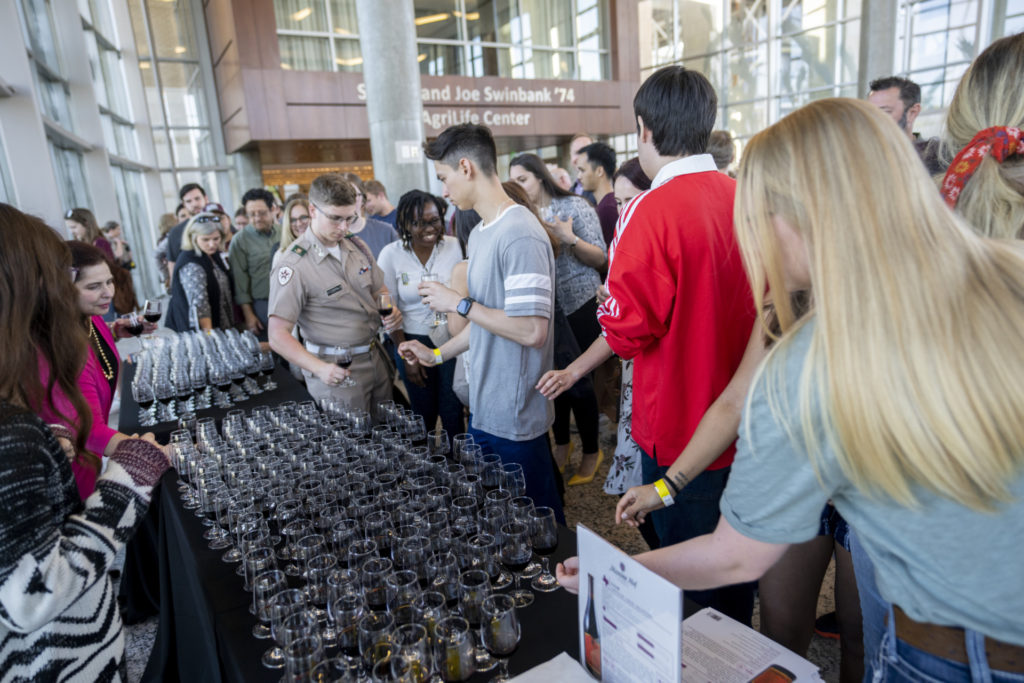A ‘spirited’ way to learn
Spirited Learning events from Texas A&M’s Department of Horticultural Sciences spotlight Texas horticulture
The Department of Horticultural Sciences in Texas A&M’s College of Agriculture and Life Sciences has created a “spirited” way to bring students and the larger Texas A&M University community together with the Texas horticulture industry.

The program is part of the department’s tripartite mission of sustainability, wellness and food security to support the Texas horticulture industry, which has a nearly $60 billion economic impact on the state.
What is Spirited Learning
The Spirited Learning initiative is a collaborative and interactive experience in which participants learn about the state’s vibrant horticulture industry while celebrating Texas wines. The program was initiated in February 2022, with over 200 participants attending each event.
“Spirited Learning experiences feature a different Texas winery each month,” said Amit Dhingra, Ph.D., head of the Department of Horticultural Sciences, Bryan-College Station. “But the overall learning experience includes information about the five major Texas horticultural industries – green industry, pecans, fruits and vegetables, controlled environment horticulture, and the wine industry – that we hope will inspire young people to consider a career in this field.”
Students, horticulture industry members, Texas A&M faculty and administrators, and community members are all among event attendees. Through face-to-face networking around the featured wines, participants learn about the variety of possibilities related to pursuing a career in any of the horticulture industries. And through the presenting winery, the attendees also learn about their history, grape varieties, vineyard management and the winemaking process.
Spirited Learning events
Some of the wineries and vineyards that have been featured during Spirited Learning events include Bending Branch Winery, Comfort; William Chris Vineyards, Hye; Messina Hof Winery, Bryan; Pebble Rock Cellars, Johnson City; and Frio Canyon Vineyard, Leakey.
On Jan. 26, Bull Lion Ranch and Vineyard from Hico was featured as the first Spirited Learning event of 2023, bringing in more than 400 attendees and breaking all previous attendance records. Dates and wineries to be highlighted during spring 2023 Spirited Learning events, all held in the Shirley and Joe Swinbank ’74 AgriLife Center on the Texas A&M campus, include:
- Feb. 24 – Haak Vineyards and Winery, Santa Fe.
- March 22 – 12 FIRES Winery and Vineyard, Johnson City.
- April 27 – Hye Meadow Winery, Hye.
- May 10 – Three wineries: Elisa Christopher Wines, Johnson City; Threshold Vineyards, Navasota; and En Gedi Vineyards and Winery, Calvert.
He said the department, university and Texas A&M AgriLife agencies have served the broader horticulture industry through research, teaching and extension.
“Now, through these Spirited Learning events, we are offering an even more in-depth look at Texas horticultural offerings and opportunities to our students and the larger A&M community,” Dhingra said.
For information about the Spirited Learning program or events, contact Dhingra at [email protected].
Horticulture industry perspectives
Brad Abrameit, president of Magnolia Gardens, Waller, and a former Texas A&M AgriLife Extension Service horticulturist serving the Rio Grande Valley, was a green industry professional who participated in a few of the Spirited Learning events.

“These events are unique in that they bring industry, academics and students together,” Abrameit said. “It provides the opportunity to build relationships that will serve everyone who attends in the future. There are many instances when people in different facets of the horticulture industry find themselves working together, and establishing these relationships can be very important in the long run.”
Blair Krebs, executive director of the Texas Pecan Growers Association, attended several of last year’s events and represented her industry.
“These events were a great opportunity to network with people involved in the Texas wine industry as well as other horticultural areas such as landscaping, the nursery business and flower arranging,” Krebs said.
She said Monte Nesbitt, Ph.D., assistant professor in the Department of Horticultural Sciences and AgriLife Extension specialist, collaborated with her on telling the story of the Texas pecan industry.
“Dr. Nesbitt brought pecans grown at the Texas A&M orchard so the attendees could taste different varieties,” she said. “He and I also shared information on the value-added aspects of pecans, changes in the industry and the need to market pecans as a healthy snack food.”
Krebs said the events also gave her the chance to tell students about opportunities in the pecan industry.
“Places like Texas A&M are where the next generation of those involved in the Texas pecan industry will come from,” she said. “And these Spirited Learning events let students know what is happening in the horticulture industry and what they might expect if they are interested in a horticulture-related career.”
Chris Brundrett, co-founder and the CEO of the William Chris Vineyards in Hye and recipient of the Outstanding Alumni Award from Texas A&M, was a presenter during one of last year’s Spirited Learning sessions. He spoke to attendees about the Texas wine industry and the winemaking process.
Brundrett, who graduated from Texas A&M in 2006 with a degree in horticulture, said the session allowed him to tell the story of the winery he co-founded with William “Bill” Blackmon as well as explain the old-world winemaking techniques the winery uses.
“It was a pleasure to present about our winery and expose those attending to the exceptional Texas wines we produce,” he said.
Brundrett added that the Spirited Learning event gave him an opportunity to meet with students who were interested in viticulture and to gauge their level of interest. He said it also reinforced his opinion of how vital universities like Texas A&M are to the future of the winemaking industry.
“I have had the pleasure of lecturing at Texas A&M for the past decade, and I can’t overstate the importance of university learning and research to the advancement of the Texas wine industry,” he said. “Universities play a key role in supplying the industry with the knowledge and skills needed to enhance this economically important sector and keep it growing.”
He said universities also help the industry by providing an educated and skilled workforce.
“At the Spirited Learning event, I was able to speak to some of the students and was impressed with their depth of knowledge of horticulture,” Brundrett said. “I felt encouraged that so many students were interested in my particular industry and winery. Right now, I have applications from two of the students in the Texas A&M horticulture department for summer and fall internships at our winery.”
Jared Kotzur, a former Texas A&M architecture student who attended the Spirited Learning event featuring William Chris Vineyards, said he enjoyed learning about Texas “terroirs” – environmental factors such as soil, climate and sunlight — that give wine grapes their distinctive character, and how these affect wine production and quality.
“For each wine we tasted, we received insights about the vineyard where the grapes were grown and what the soil and weather conditions were like during the year the grapes were harvested,” Kotzur said. “It gave me a greater appreciation for all the work that goes into the winemaking process.”
The importance of networking
“One of the best things about these events is that they are a great networking opportunity for the students,” said Justin Scheiner, Ph.D., associate professor in the Department of Horticultural Sciences and AgriLife Extension viticulture specialist, Bryan-College Station. “They allow students to meet with people in the horticulture industry and learn more about those industries. They also make professional contacts who can help lead them to a career in the wine industry, green industry or another horticulture-related career.”

Networking through these Spirited Learning sessions led Dorado Delgado, who this semester will complete his bachelor’s degree in horticultural science with a Certificate of Enology and Viticulture, to a position as a laboratory assistant at the Messina Hof Winery. Delgado now works at the winery full-time while he completes his horticulture degree.
“I went to almost all of the Spirited Learning sessions offered in 2022 and made it a point to speak with the people who represented the wineries and let them know of my interest in working in the wine industry,” Delgado said.
He said at one event, Paul Bonarrigo, one of the owners at Messina Hof, invited him to interview for a position at the winery. Degado got the job and has been working there for the past nine months.
Delgado said the knowledge he gathered from attending the sessions also helped him better understand the wine industry and some of its challenges.
“I got to know a lot about producing wine here in Texas,” he said. “One of the common challenges among wineries here is trying to keep their wines chemically stable and in the proper pH range due to the heat. I learned about these and other challenges at these sessions, including one where Dr. Andreea Botezatu, assistant professor in the Department of Horticultural Sciences and enology Extension specialist, spoke about the sensory aspects of wine.”
Dhingra said another advantage of the events is they provide an informal setting for exchanging ideas and experiences.
“People from diverse backgrounds who may never find themselves under the same roof can now mingle freely and become a part of a larger community around horticulture,” he said. “Plus, people always tend to share a little more freely and connect more deeply over a good glass of wine.”





